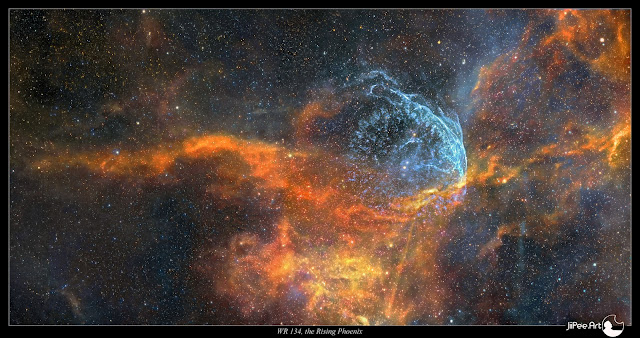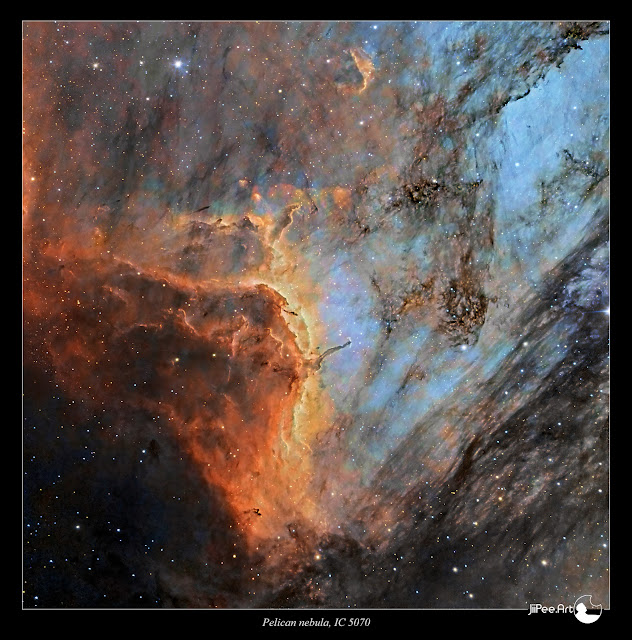COPYRIGHT, PLEASE NOTE
Tuesday, October 29, 2024
Methuselah Nebula, MWP1, project finalized
Click for a full size image
A single, full size, 20 min H-alpha and O-III exposure
Click for a full scale image.
Both images below are jpg photos of a single full size, 20 min. FIT-format 16 bit image.
Photos are calibrated with darks and bias corrected flats and are heavily stretched to show even a hint of the actual nebula.
H-alpha
Sunday, October 20, 2024
A start of the new imaging project, MWP1, the Methuselah Nebula
MWP1 ( Motch-Werner-Pakull 1, PN G080.3-10.4, PK 080-10.1) is a very old, dim and diffused planetary nebula in constellation Cygnus, the Swan. It's one of the largest planetary nebula known, it spans about 15 light years of space. The apparent size in the sky is 15.52 x 13,13 arcminutes. (Full moon has a diameter of 30 arcminutes) The estimated age of the nebula is 150.000 years.
MWP1 is a very usually shaped, unusually large, and unusually old, planetary nebulae. The progenitor star is also one of the hottest stars known, so hot it is producing large amounts of X-rays. There are not very many photos out of this difficult target.
This is a start of the imaging project with my new imaging system. So far I have shot 15 hours of light from an ionized oxygen, O-III. I'll shoot two other emission lines, H-alpha and S-II, when ever the weather allows it. The triple ionized oxygen emits blueish light, in this image the O-III emission is colorized to blue. I can produce a real three band color image after I have collected enough light for ionized hydrogen and sulfur.
MWP1, the Methuselah Nebula
Click for a large image
A single full scale 20 min O-III exposure
Click for a full scale image.
Friday, October 18, 2024
NOCTURNE EXIHIBITION
First exhibition for a while, this time in my home town Oulu.
A new Art Gallery, AudioGalleria, has it's second exhibition build around my photos.
The exhibition starts at Saturday19.10 with opening party at 18.00 - 20.00, you all are welcome to enjoy my cosmic nature photographs and complimentary sparkling wine!
Ps.
At Fathers day, Sunday 10.11 at 16.00 I will give a public presentation about my work in Valvesali at down town Oulu. All fathers and other guests are welcome.
After the dry lecture we serve complimentary sparkling wine in nearby AudioGalleria.
Tuesday, October 15, 2024
WR 134, The Rising Phoenix
BUY A POSTER
https://astroanarchy.zenfolio.com/
This is the second light for my new imaging setup, the first light image can be seen HERE
For years I have wanted to shoot a long focal length photo of this amazing mass ejecting star in constellation Cygnus, the Swan. Past five years I have done short focal length imaging with camera optics, now it's time to get closer.
I spent several clear nights to capture light emitted by an ionized elements in this gas formation. (H-alpha, S-II and O-III) For compositional reasons I ended up to a two panel mosaic image. Total exposure time is 23h.
When processing the final image I couldn't be noticing how much this formation looked like a mystical creature, the Phoenix Bird. I rarely use any other than official catalog numbers as a name of my photos but this time I simply had to name this composition to "Rising Phoenix".
When art meets science, the results can be beautiful. It can become something more than either of them on their own can ever be.
WR 134 as a Rising Phoenix
Click for a large image, 2500x1300 pixels photo shows the WR 134 like never seen before.
 The photo is in mapped colors from an ionized elements, H-alpha=green, S-II=red and O-III=blue, Original resolution is 12.000 x 7000 pixels
The photo is in mapped colors from an ionized elements, H-alpha=green, S-II=red and O-III=blue, Original resolution is 12.000 x 7000 pixelsInfo about the WR 134
WR 134 is a variable Wolf-Rayet star located around 6,000 light years away from us in the constellation of Cygnus. It's surrounded by a faint bubble of glowing ionized oxygen, blown out by the intense radiation and fast solar wind from the star. The star has five times the radius of the sun and it's 400,000 times more luminous.
My Wide Field Photo of the Area
Click for a large image, ~2500x2000 pixels
WR 134, the Rising Phoenix in visual spectrum
Click for a large image, ~2500x1300 pixels
Click for a large image
A single, full scale, 20 min O-III exposure
Click for a full scale image.
This is a dim target, 1200s O-III exposure doesn't show much about the O-III formation around the star WR 134.
 This is one of the test shots after the collimation procedure. Exposure time is 1200s with 3nm O-III filter. Image is calibrated with Dark Frame and Bias corrected Flat Frame. Target is WR 134 in Cygnus. Stars are pinpoint from corner to corner. Optical analysis of this frame can be found at end of THIS blogpost
This is one of the test shots after the collimation procedure. Exposure time is 1200s with 3nm O-III filter. Image is calibrated with Dark Frame and Bias corrected Flat Frame. Target is WR 134 in Cygnus. Stars are pinpoint from corner to corner. Optical analysis of this frame can be found at end of THIS blogpost
BUY A POSTER
https://astroanarchy.zenfolio.com/
Wednesday, October 9, 2024
FIRST LIGHT FOR MY NEW IMAGING SETUP
After a couple of years I'm able to publish a bran new photo!
This is a first light to my new imaging setup, it took couple of years to get it up and running.
I selected a relatively bright target since I wanted to test the system as soon as possible. The Pelican Nebula in constellation Cygnus, the Swan, is my first target.
The new system has a focal length of 2730mm with a massive 0.7 focal reducer for the Celestron EDGE 14" telescope. The new camera has 12 micron pixel size and it gives me an image scale of 0.91 arc seconds/pixel. (That's perfect for my seeing conditions.) The field of view spans 46.1 x 46.1 arcminutes of sky. (For a scale, Full Moon covers 30x30 arcminutes of sky)
The native resolution of the Apogee Alta U9000M camera is 3056x3056 pixels. I'm using a stacking method that doubles the measures by using the "Drizzle" while imaging. The final image is then 6112x6112 pixels.
Only five hours of light from an ionized hydrogen (H-alpha) is used for this photo. Other two color channels, O-III and S-II, are borrowed from my older long focal length photo of this target taken with Celestron EDGE 11" telescope.
Pelican Nebula
Click the photo to see a 2000x2000 pixel version

Click the image to see a full size version
This photo is in mapped colors from light from an ionized elements, hydrogen = green, sulfur=red and oxygen=blue. (H-alpha, S-II and O-III)
Click the image to see a full size version, 3056x3056 pixels




























